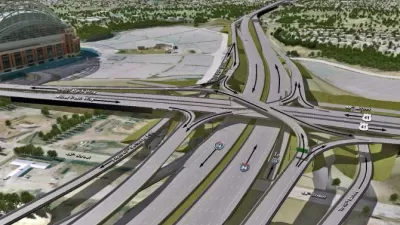A federal court has ruled that a proposed highway expansion said to be the largest single transportation project in Wisconsin history must consider regional impacts (on sprawl and transit-dependent populations) in its environmental analysis.
"It is just an interim ruling, but it is potentially an important one: In a suit brought by inner-city, minority plaintiffs, the US District Court in Milwaukee has indicated that the Federal Highway Administration (FHWA) and Wisconsin Department of Transportation (WisDOT) cannot enlarge a major urban freeway connection without further study of the project's impacts on transit-dependent populations and on regional suburban sprawl," reports Kaid Benfield. "For now, the case is headed to mediation; but the court's ruling on legal issues in the case, as articulated in an opinion signed by federal judge Lynn Adelman, is potentially significant to other highway-expansion controversies with similar circumstances."
"The court rejected the agencies’ argument that they need only study the impacts in the specific area where the highway expansion was taking place, finding that it would defeat the “action-forcing” intent of the National Environmental Policy Act (NEPA) if a piecemeal approach to highway projects and analysis allowed cumulative regional impacts to escape scrutiny."
FULL STORY: Federal court says highway sponsors must first study transit, impacts on suburban sprawl

Study: Maui’s Plan to Convert Vacation Rentals to Long-Term Housing Could Cause Nearly $1 Billion Economic Loss
The plan would reduce visitor accommodation by 25,% resulting in 1,900 jobs lost.

North Texas Transit Leaders Tout Benefits of TOD for Growing Region
At a summit focused on transit-oriented development, policymakers discussed how North Texas’ expanded light rail system can serve as a tool for economic growth.

Why Should We Subsidize Public Transportation?
Many public transit agencies face financial stress due to rising costs, declining fare revenue, and declining subsidies. Transit advocates must provide a strong business case for increasing public transit funding.

How Community Science Connects People, Parks, and Biodiversity
Community science engages people of all backgrounds in documenting local biodiversity, strengthening connections to nature, and contributing to global efforts like the City Nature Challenge to build a more inclusive and resilient future.

Alabama: Trump Terminates Settlements for Black Communities Harmed By Raw Sewage
Trump deemed the landmark civil rights agreement “illegal DEI and environmental justice policy.”

Dear Tesla Driver: “It’s not You, It’s Him.”
Amidst a booming bumper sticker industry, one writer offers solace to those asking, “Does this car make me look fascist?”
Urban Design for Planners 1: Software Tools
This six-course series explores essential urban design concepts using open source software and equips planners with the tools they need to participate fully in the urban design process.
Planning for Universal Design
Learn the tools for implementing Universal Design in planning regulations.
City of Santa Clarita
Ascent Environmental
Institute for Housing and Urban Development Studies (IHS)
City of Grandview
Harvard GSD Executive Education
Toledo-Lucas County Plan Commissions
Salt Lake City
NYU Wagner Graduate School of Public Service





























